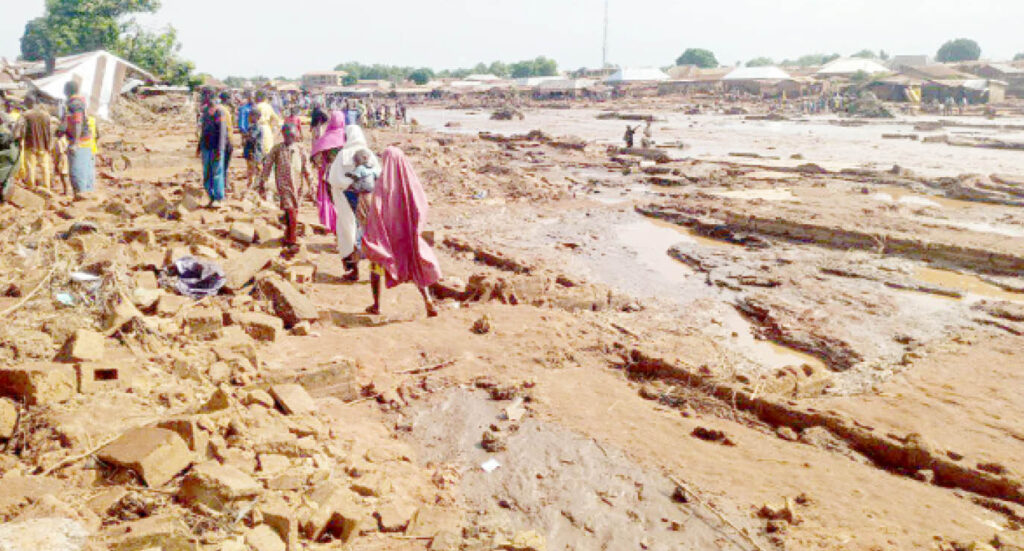Despite federal warnings and the growing threat of deadly floods across the country, many residents in high-risk communities are refusing to evacuate, citing lack of alternatives and broken promises by authorities. Instead, they are calling on the government to deliver on its commitments and provide meaningful support before disaster strikes.
This comes in the wake of a devastating flood in Mokwa, Niger State, where over 200 lives were lost and hundreds more declared missing. The federal government has since raised alarm over imminent flood risks in 30 states and the Federal Capital Territory.
Minister of Water Resources and Sanitation, Prof. Joseph Utsev, attributed the Mokwa tragedy to intensified rainfall worsened by climate change, and blamed the high casualty figures on residents’ failure to heed early warnings. The affected states include Niger, Lagos, Bayelsa, Benue, Adamawa, Edo, and Jigawa, among others.
But on the ground, it is a different story.
In communities like Ilushi and Udaba in Edo State, residents say relocation is not an option. Their ancestral lands are not just homes but also their primary sources of livelihood.
“We are waiting for the flood. When it comes, we’ll do what we’ve always done — survive,” said Odio John, a resident of Ilushi. “There’s no other place to go.”
Despite state government efforts to renovate Internally Displaced Persons (IDP) camps, many villagers claim the facilities are either unfinished or poorly maintained. Solomon, another resident in Etsako Central, noted, “The IDP camp is not ready, and we are left with nothing but prayers.
In Yenagoa, Bayelsa State, residents in Igbogene, Akenfa, Zarama, and Azikoro have resorted to desperate DIY solutions. Wooden structures known locally as “monkey bridges” now serve as elevated walkways to access submerged homes. Inside their houses, some have installed wooden platforms to keep valuables above water level.
“We’ve seen improvements from the state’s desilting efforts,” said Godwin Igiri, a landlord in Goodnews Street. “But we can’t just leave our homes.”
Officials say canal and creek clearing operations are ongoing, but residents remain wary.
In Bakin Kogi near the River Benue, some residents are taking initiative. Emmanuel Ajisani said he had already moved personal belongings to relatives in safer locations.
However, others like Daniel Akinsare, a farmer and fisherman, say they have no plans to leave.
“I’ve suffered loss before from flood, but this is my life, my farm. I’m staying,” he said defiantly.
Meanwhile, Hauwa Muhammed Moscow, another resident, criticized the government’s failure to properly sensitise at-risk communities. “Most victims don’t get the palliatives. The help rarely reaches us,” she said.
Benue and Jigawa: Waiting and Watching
In Benue, residents in flood-prone areas like Makurdi and Agatu are adopting a wait-and-see approach. “The rain pattern hasn’t given us a reason to panic — yet,” said Eunice Tule from Wadata.
Others, like Attah Ede in Apaa community, say they are unwilling to abandon properties they’ve worked hard to build.
In Jigawa, residents have returned to homes ravaged by previous floods, ignoring evacuation advice. According to local authorities, several areas remain dangerously exposed.
“We’ve sensitised the communities, but people are still unwilling to move,” said Ali Muhammad, information officer of Buji LGA.
Billions Disbursed, Little to Show
The situation has renewed scrutiny over the use of the Ecological Fund. Data from the National Bureau of Statistics shows that N39.62 billion was disbursed to states and the FCT between June 2023 and June 2024 to tackle ecological challenges.
In addition, President Bola Tinubu approved N3 billion for each state to respond to natural disasters, but many residents claim they’ve seen little impact from these funds.
“Where is the money going?” asked Dr. Adedoyin Adeleke, Executive Secretary of Green Growth Africa. “Most state officials don’t even know how to access the Ecological Fund. There is a glaring knowledge gap.”
Experts Warn of Looming Catastrophe
Environmental experts are urging proactive intervention. Prof. Nasiru Idris of Nasarawa State University called for the construction of small dams in flood-prone areas, improved building regulations, and a functional early-warning system.
Rachel Achimba, an environmentalist, pointed to the link between flooding and poor waste management. “Plastics and refuse choke our waterways. It’s a man-made disaster,” she said.
Both experts stressed that without immediate action, Nigeria risks repeating — or worsening — the tragedies of past years.
A National Emergency in the Making
Figures from the National Emergency Management Agency (NEMA) paint a grim picture: over 1,200 deaths, more than 1.2 million displaced, and farmlands spanning 1.4 million hectares destroyed in 2024 alone.
In Borno, Governor Babagana Zulum recently called on the federal government to fast-track work on the Alau Dam to prevent further disasters. “Work is not progressing as expected,” he lamented.
Source :Daily Trust
Do you want to share a story with us? Do you want to advertise with us? Do you need publicity for a product, service, or event? Contact us on WhatsApp +2348183319097 Email: platformtimes@gmail.com
We are committed to impactful investigative journalism for human interest and social justice. Your donation will help us tell more stories. Kindly donate any amount HERE




